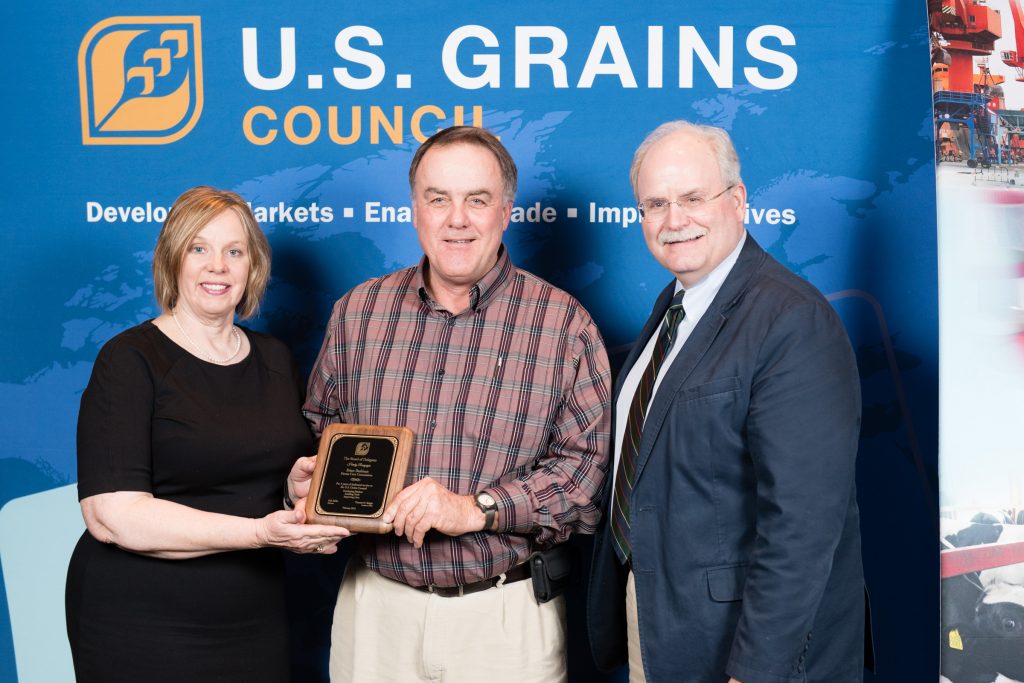Western Kansas businessman and U.S. Grains Council (USGC) delegate Brian Baalman uniquely understands the importance of capturing growing overseas demand for feed grains in all forms because of his own investments in Kansas.
He manages extensive operations, including a 10,000 acre farm with his sons, a 10,000-head feedyard at the farm and is a partner in two other commercial feedyards. He also has served on the board of Western Plains Energy since the ethanol plant’s inception and holds equity interest in nearly all ethanol plants in Kansas.
The Council recognized Baalman for five years of service during the organization’s 15th International Marketing Conference and 58th Annual Membership Meeting in Houston, Texas, earlier this year. His experience utilizing U.S. grains from the field to the ethanol plant to the feedyard makes Baalman’s perspective on market development – at home and abroad – a valuable addition to the Council’s Ethanol Advisory Team (A-Team).
“Ethanol is near and dear to me, but trade is also about adding value to corn and looking for ways to move any bushel we can,” Baalman said. “We grow corn and wheat and milo on our farm. It is an advantage to have a market to move those bushels somewhere, develop that market and keep it.”
As organizations like the Council develop markets for grains in a value-added form, the increase in demand helps provide added stability for farmers and agribusinesses back home – as was the case with the Council’s work to build a large and diversified market for dried distiller’s grains with solubles (DDGS).
“All of us in the ethanol industry have witnessed the steady distiller’s price compared to the early years,” Baalman said. “We used to have demand in the winter and then falling off in the summer. Today, that has leveled out and it is largely due to the export market for distiller’s. We have a large volume of distiller’s moving around the world, and that is due to the Council.”
Even more potential for this type of market expansion exists for ethanol exports, particularly in interconnected markets like Mexico and Canada and countries like Japan, Colombia and Peru. But, Baalman cautions capturing and securing U.S. market share requires continued investment not just from farmers and businessmen like himself, but government market development programs like the Market Access Program (MAP) and the Foreign Market Development (FMD) program.
Baalman noted the investments of other market participants, like the European Union, into their own market promotion programs far exceed the funds dedicated to this work by the U.S. government. That competition threatens markets that organizations like the Council have spent decades to develop.
Still, the investment of state checkoff dollars into the Council, leveraged from the bushels produced on U.S. farms and with support from agribusinesses like Baalman’s, continues to pay off significantly. This return on investment is not only in the form of tonnage exported, but also in the successful establishment of overseas expertise that continually works on behalf of U.S. farmers and agribusinesses.
“There are a lot of avenues through which that checkoff dollar is leveraged,” Baalman said. “It has been a win-win situation for organizations like the Kansas Corn Commission as well as producers to have the Council in place and the expertise in these offices to navigate the issues in each market. It is no easy task.”
About The U.S. Grains Council
The U.S. Grains Council develops export markets for U.S. barley, corn, sorghum and related products including distiller’s dried grains with solubles (DDGS) and ethanol. With full-time presence in 28 locations, the Council operates programs in more than 50 countries and the European Union. The Council believes exports are vital to global economic development and to U.S. agriculture’s profitability. Detailed information about the Council and its programs is online at www.grains.org.

